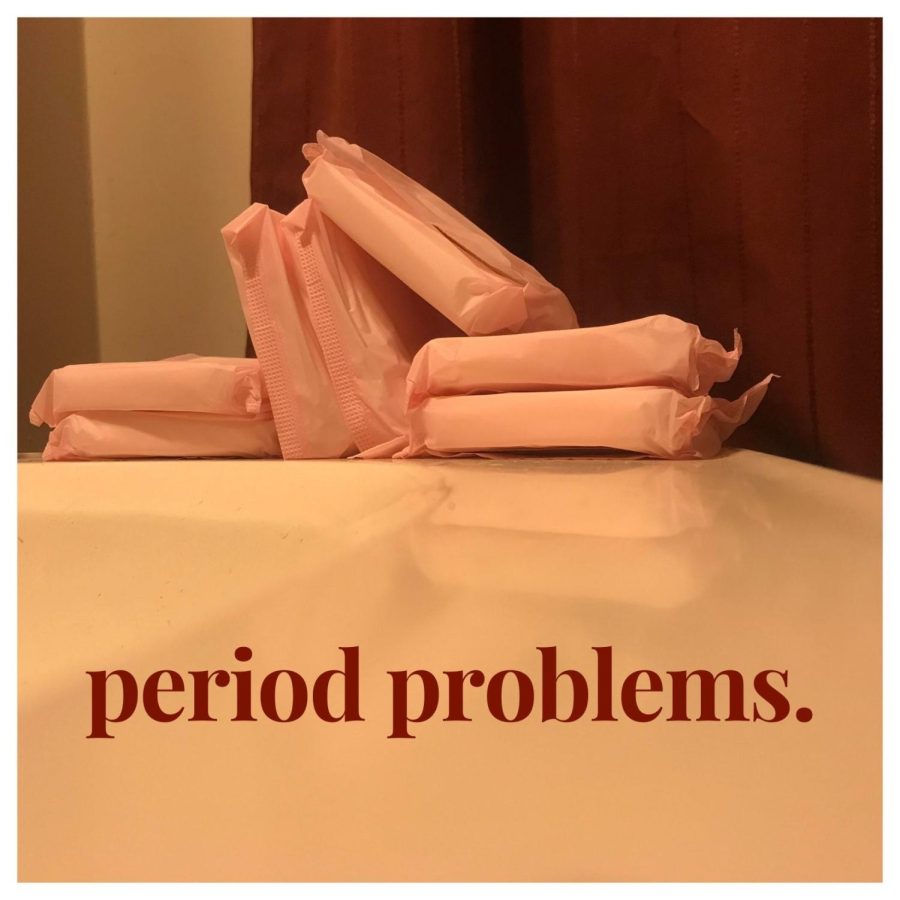Girls impacted by stigmatization of menstrual cycle
February 11, 2022
Imagine, it’s a regular Tuesday and a student is sitting in class with one of her friends working on something. She gets up and asks to go to the bathroom with her pass signed, looking stressed. She’s the only one who knows that she has started her period and because of this, the teacher asks her to go sit back down and finish her worksheet, so the class can continue on with the lesson. She’s too embarrassed to say that she has started her period and that it’s an emergency, so she sits back down. This happens to girls around the world everywhere and because of that, some feel uncomfortable talking about it.
“I have felt embarrassed. Not because the process itself is embarrassing, but rather society teaches young people that a period is a nasty, gross thing that is not appropriate to talk about… I understand that teachers have a job to do, and that it is easier to do if all of their students are present, but I would think that as high school students, we would be treated like we understand that we are missing content when we need to use the bathroom, instead of being treated like vandals trying to escape a boring lecture,” senior Charlotte Boyle said.
Not only are girls told to wait at specific times, a lot of girls believe they aren’t taught quite enough of what they need to know about how their bodies are on their menstrual cycle, how the menstrual cycle works, and why women have to deal with the menstrual cycle.
“I don’t think schools made it clear enough of products and occurrences and what it even means. All I learned was that I was supposed to start bleeding, and it would be this huge deal and coming of age experience, but not necessarily what it meant for my body or how I should go about getting my period,” junior Katie Hovan said.
“In elementary school, boys and girls were separated to talk about puberty, and the girls were told in essence that we will bleed every month. We didn’t learn anything about why that bleeding happens until junior high classes, and even then it was incredibly rushed because it was an uncomfortable topic,” Boyle said.
Additionally, some women feel the menstrual cycle is deeply stigmatized and makes it an uncomfortable topic, but girls also often get taunted by their male counterparts about the effects of the cycle.
“Being a moody woman doesn’t mean we’re on our periods. It can hurt to be on a cycle, like that where your body is just trying to do its functions to keep girls healthy and there shouldn’t be any shame about it towards us no matter how we act,” Hovan said.
Now that teachers have to call down to the nurse to let a student be seen, if a girl needs any sort of feminine hygiene product, like a pad or a tampon, it is a long process just to get something.
“Feminine hygiene products should be free in general, because this is an unavoidable, natural process for 50 percent of the population. The school provides free toilet paper, so they should provide free feminine products for the exact same reason. I would even go as far to say that these products should be available in all bathrooms; Men’s, women’s and Gender Neutral bathrooms, because not just women get periods. Also, some students may not have access to feminine hygiene products at home, so the school may be their only option. And, if the administration is so worried about students missing class due to their period, offering products in the bathroom would cut down on a trip to the nurse,” Boyle said.







![Inspiration. Ten years ago, Price and Saboe found a way to memorialize Dodson and her impact in the volleyball program. The Erin Dodson Memorial volleyball games highlight Dodson's determination and positivity, even in the face of obstacles. "[We wanted] to be able to give to others based on the legacy that Erin had created as a person," Saboe said. "[We] thought honoring her like this would be the best way that we can honor her."](https://aahsmountainecho.com/wp-content/uploads/2025/10/IMG_1319-1-e1759443066570-300x165.jpg)
